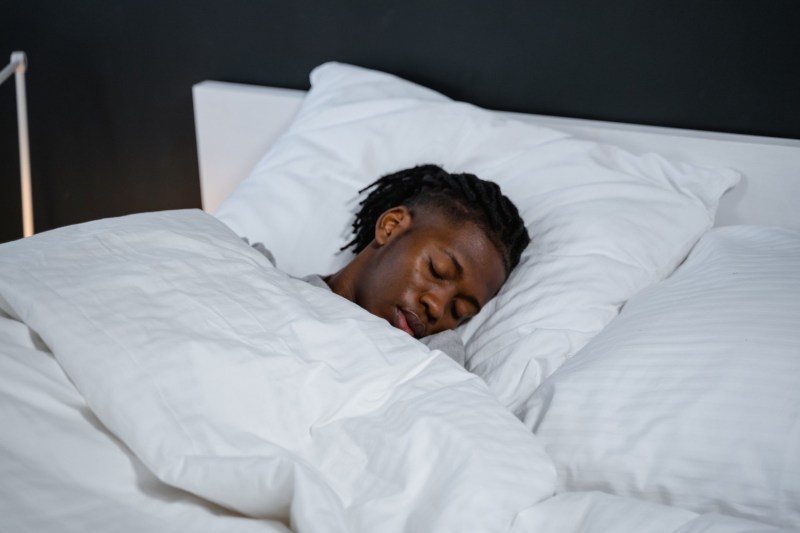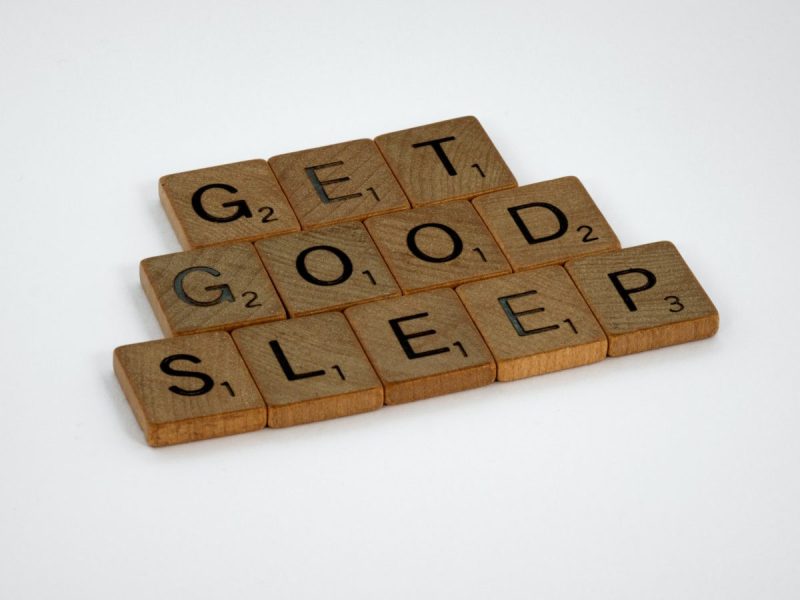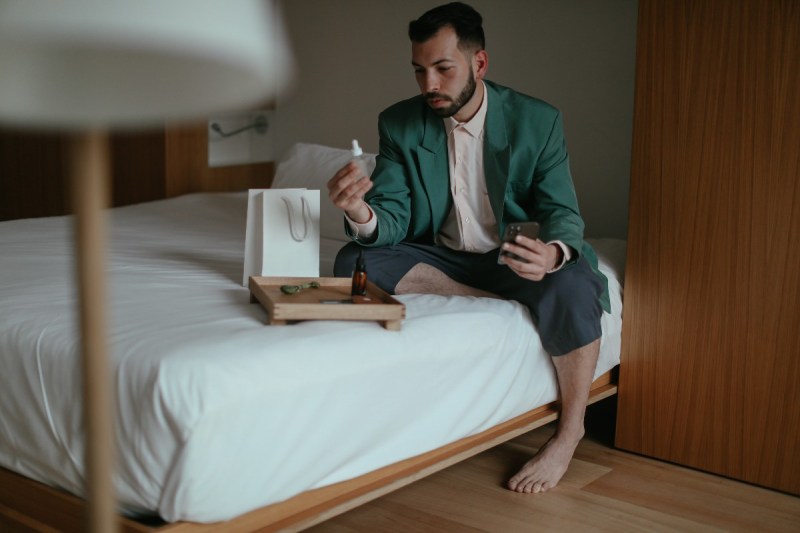It’s a human experience that's almost as universal as life itself. You lie down in bed after a wildly busy day, and you eagerly await the onset of eight hours of sweet, restful escape, only to feel your brain go into overdrive the second your head hits the pillow.
Soon enough, you're checking emails, falling down all sorts of Reddit rabbit holes, and looking for that one viral TikTok video that your friends won't stop talking about. Eventually, the clock nears midnight, and you're still painfully wide awake and wasting away the night on your internet-enabled device.
We feel you. Unfortunately, our bodies don’t come with a built-in sleep button, but there are still plenty of things we can do to help yourself fall asleep faster.
To help crack the code on how to fall asleep fast, we reached out to the sleep experts at Calm, a sleep and meditation app: Dr. Colleen Carney of Ryerson University and Dr. Michael Breus, a diplomate of the American Board of Sleep Medicine.
Here are their top tips for how to go to sleep, stay asleep, and get a better start to your next day.

What to do at night
Stick to a schedule
If you need help with sleep, it may simply be a matter of timing. As much as we want to disrupt the space-time continuum and add a few more hours into our days, it's best to leave that fantasy where it belongs — in the realm of science fiction. Our circadian rhythms are real, and they’re often the reason we can’t seem to stop pushing the snooze button.
Regardless of the hours we keep, our brains will naturally try to ensure we get enough sleep by adjusting how much melatonin (the hormone that makes us sleepy) our bodies produce throughout the day. Maintaining a consistent bedtime and wake-up time — yes, even on the weekend — is critical to allowing your circadian cycle to properly reset each day.
Here’s the real tea: Those late-night Hulu binges aren't doing you any favors! If you’re having trouble falling asleep at night, you need to start by getting on a consistent schedule. Make sure you go to bed and wake up around the same time — every. single. day.
Although it may be tough at first, after a few days or weeks, your body will respond in kind by adjusting melatonin production to reflect your new, consistent sleep schedule. The end result will be better sleep and a much easier time pulling yourself out of bed in the morning.
Have a wind-down routine
For truly restful sleep, you need a way to disengage from all the problems you experience in your day. Finding your perfect wind-down routine may take some trial and error, so try something new if your current routine isn’t working out.
For some people, a nightly self-care routine can help wash away the day’s stresses. Try showering, shaving, washing and moisturizing your face, and other hygiene routines to help you get into a relaxing mindset before you lie down.
It’s a good idea to limit screen time when you’re trying to settle in for the night, but you don’t have to abandon your phone entirely. Apps like Calm can whisk you off to sleep with soothing music, guided meditations, and "Sleep Stories."
Fall asleep to relaxing tales read by your favorite soothing speakers, like Stephen Fry, Bob Ross, and even the bedtime story from Game of Thrones' Bronn you didn’t know you needed. You can also try things like sleep masks to block out light while you drift off or aromatherapy to aid in relaxation.
Don’t force it
Sometimes, even despite your best efforts, your body still isn’t ready for sleep when you want it to be. While consistency is key to falling asleep fast, you can't force yourself to sleep when your body isn’t ready, no matter how many times you lament, "I can't sleep!"
Instead of helping you figure out how to fall asleep fast, attempts to force yourself to fall asleep will probably lead to frustration and increased restlessness. Despite what your parents may have implied when you were young and uncooperative, our sleep experts recommend against actively “trying” to fall asleep in bed.
If you’ve ever tried this method yourself, you can likely attest to the fact that staring wide-eyed into the darkness while thinking about how tired you wish you were doesn’t exactly whisk you away to dreamland.
Instead, accept that you’re not ready and find a relaxing activity — reading, turning on some soothing music, or meditating — while you wait for sleep to naturally unfold.

What to do during the day
Although your frustration comes when you’re lying awake at night, setting yourself up for easier sleep is something you can work on during the day as well. Here are a few things you can do during the day to help you fall asleep faster when bedtime rolls around.
Get some sun
Remember that circadian rhythm that your body uses to ensure sufficient rest? It’s not just affected by what’s going on inside your body — it also relies on light cues from your environment to determine when you should be alert and when you should be sleeping soundly. This is why many people find it difficult to sleep during the daytime, and this explains why so many of us prefer darkness when we’re nodding off.
Just like sticking to a consistent sleep schedule can keep your internal clock ticking properly, getting some sun when you wake up in the morning can help your circadian rhythm reset for the day, too. Try to incorporate 15 minutes of sunlight into your morning routine by enjoying your coffee on the patio, taking an early morning stroll, or cracking open a few windows while you make breakfast.
This won’t just help you wake up faster in the morning, but it will also ensure that your body and mind are on the same page when it’s time to wind down for the day, too.
Exercise (but time it right!)
Unsurprisingly, daily exercise can go a long way in cracking the code on how to go to sleep. On top of helping tire you out, exercise can also help regulate your circadian rhythm, reduce anxiety, and improve your mood. When it comes to sleep, though, Dr. Carney and Dr. Breus stress the importance of timing.
Exercise raises your core temperature, and the subsequent lowering of that temperature helps your body prepare for sleep. Try timing your workout for about four hours before you plan to go to bed. Otherwise, your increased core body temp may affect your ability to sleep at night.
Limit caffeine and alcohol
Don’t worry, we’re certainly not telling you to quit coffee and cocktails entirely. Instead, Dr. Carney and Dr. Breus simply recommend being more mindful about when you’re indulging. Caffeine has a half-life of six to eight hours, so you should stop refilling your mug at 2:00 p.m. if you want an easier time going to sleep by 10:00 p.m.
Many of us can relate to the need for a warm cup of brew to jump-start the day, but that energy spike you crave in the morning is the last thing you need when you tuck in for the night.
Anyone who has ever over-indulged can tell you that alcohol can make you feel sleepy, but it’s important to remember that the quality of your sleep matters, too. Although alcohol causes a brief increase in the production of sleep-inducing chemicals in your brain, it also blocks REM (rapid-eye-movement) sleep, which is vital for truly restorative sleep.
Have you ever woken up after a night of liquor-powered partying, only to feel like you haven’t slept at all? You can thank a lack of REM sleep for that frustration. If you want to treat yourself to a nightcap, Drs. Carney and Breus recommend that you do so about three hours before your bedtime to allow your body enough time to fully digest it.

Here's what else you can do to improve your sleep
Find better ways to manage stress
Stress can be such a mess. In fact, organizations like the American Psychological Association and the World Health Organization have warned in recent years about this growing "mental health crisis", and experts like those at the Cleveland Clinic have noted how excess stress can negatively impact sleep.
In addition to establishing a wind-down routine, as we discussed above, you can deploy relaxation techniques any time you need to calm down and let go of whatever's freaking you out. For some people, it might be tuning into their favorite podcast. For others, it may be turning on some classical music at a very low volume. If you need more help in this realm, it's never a bad idea to reach out to a mental health professional who's properly trained in Mindfulness-based stress reduction (MBSR).
Try the military method: It's far less scary than it sounds
As intimidating as something called the military method might appear at first, it's actually quite simple.
Start by "blanking your mind", and you can do so by relaxing your facial muscles, dropping your shoulders, and relaxing your arms. From there, breathe out, relax your chest, and let go of any remaining thoughts that might still be racing through your head. If you're still having trouble on that last part, try repeating, "Don't think," until this truly is the case.
Limit your nap times
As noted earlier, schedules are quite important. This includes nap time. If you're napping for longer than 45 minutes, and especially if you're taking multiple naps late in the afternoon and well into the evening, you risk nighttime grogginess and more difficulty in falling asleep for a proper six to nine hours later at night.
If you like to recharge with a nap, don't snooze off for more than 45 minutes. Instead, try establishing a set nap time between 1:00 and 3:00 PM, and try to keep your nap within a 10 to 20 minute time frame for optimal benefits.
Cool down
Because our core body temperatures decrease when we sleep, it helps to stay cool while in bed. You can start to cool yourself down by taking a shower before jumping into bed. If you prefer hot baths, then take your bath well before going to bed in order to give your body ample time to cool down post-bath.
If your bedroom feels hot and stuffy, try opening your window if you live in a cool enough environment to provide a refreshing nighttime breeze. If you live in a hotter climate, close the window and crank up your air conditioner instead to cool down. Also, try turning a fan on in your room at night to create your own refreshing breeze. (In addition, a fan might produce the bonus benefit of ambient noise that can help you fall asleep.)
When it comes to the fastest way to fall asleep, you’ll find that everyone has different needs. Luckily, there are some universal truths to the way our bodies and brains get tired that you can use to your advantage. Remember that consistency is key, and it may take some experimentation to find your ideal relaxation routine. Use these expert tips wisely and you’ll be on your way to falling asleep fast.
If you need some more help in falling asleep and making your nights more restful, check out our top tips for better sleep, our picks for the best pillows for neck pain, and our favorite memory foam mattresses. Cheers to a better night's sleep!
The cover photo was taken by Tony Alter, licensed under Creative Commons, and made available by Flickr.
Editors' Recommendations
- How to watch MLB and MLS games free all season long
- Sling TV packages: Here’s how much the service costs
- How to smoke a cigar: Our ultimate guide
- Cigar humidor 101: What they are, how they work, and our top picks
- What is the best mattress thickness for exceptional sleep?




